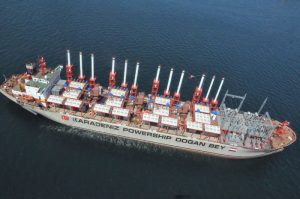
Umm Muhammed Umar
The decision to approve three generation licenses to floating power ships provider Karpowership SA, by the National Energy Regulator of South Africa (NERSA) has been condemned by environmental groups. The decision was taken at a special (NERSA) meeting yesterday afternoon, with generation license approval for Saldana Bay, Coega and Richards Bay. Radio Islam spoke to Neville Roy, the community outreach coordinator of the Green Connection.
Roy said that his organisation was, “totally shocked, shocked, in the biggest sense of the word that NERSA will allow or make such a decision when there’s so much controversy around the Karpowership issue.” Roy added, “the dust of most of the allegations made around irregularity, has not even settled, the Department of Environmental Affairs processes are not even entirely done, and yet they have made this decision.” He says that the Green Connection does not agree with the decision, but that what they do agree with is the decision not to authorize Karpowerships in our oceans, because of various concerns, including noise, underground water noise levels, and also the livelihoods of fishing communities in these areas.
Roy emphasized that the three areas, Saldana Bay, Coega and Richards Bay, for which licences had been approved, were extremely environmentally sensitive. He said that any ocean has its own unique ecosystem. Roy had spoken to the Saldhana Bay community, which informed him that the harbour was a special breeding ground for the type of fish that they catch, and that would be interrupted by a noisy ship pumping hot and cold water in and out, with pipelines snaking through the harbour system. It would be a major interruption for such an ecosystem.
Environmental groups have been opposed to Karpowership projects changing the lives of small-scale fishing communities and environments. Roy says that they do not believe that they are a solution to the energy emergency that the country is currently facing. He says its known that it would be a gas power ship stationed in the harbour, and they are concerned about the risks, such as possible explosions, pipes bursting, and wind storms. He said that there was also a steel company pumping steel into the ocean. He expressed concern about the steel mixing with the gas residue being dumped in the ocean: “ What type of pollution do we then have in the ocean?” Roys concerns also extended to the fisherman, “they will station the ships, for example, in Saldhana, in Big Bay, known to the fisherman as Pepper Bay, and fishermen will be once again be marginalized and undermined and told, ‘you’re not allowed to fish here’.” These fishermen do not own large vessels and cannot even afford the petrol to be able to fish deeper out in the sea.







Well done,true news with great, results.